#communities not corporations are the face of the revolution
Explore tagged Tumblr posts
Text

happy pride month remember trans rights are human rights and no cops at pride and rainbow capitalism is a scam!! ❤️🧡💛💚💙💜
#no one is more 'be gay do crime' than the crows#also remember queerness is a lovely and sacred facet of identity but it does not absolve you of other biases!!#intersectionality is so so important!#queer people are not a monolith! queerness means different things to different people! and that's kickass!!!#the fight for queer liberation is part of a larger struggle against multiple interlocking systems of oppression!!#you cannot separate them!#the first pride was a riot#communities not corporations are the face of the revolution#also i stg if they don't let nina kiss more people in the spin-off (MANIFEST MANIFEST MANIFEST) i will riot#let women kiss!!!!!!!!!!!!!! in media and in real life!!!!#shadow and bone#six of crows#crooked kingdom#sab#shadow and bone season 2#wylan van eck#nina zenik#jesper fahey#inej ghafa#kaz brekker#matthias helvar#sab cast#jack wolfe#danielle galligan#kit young#amita suman#freddy carter#calahan skogman#no cops at pride#trans rights are human rights
39 notes
·
View notes
Text
MOMMY KNOWS BEST: A NEW APPROACH TO MARRIAGE?
By Emily Dawson, Investigative Reporter
In an era of rising divorce rates and failing marriages, one company believes they have found a radical yet effective solution—one that redefines the roles within relationships rather than dissolving them.
The "Mommy Knows Best" (MKB) program, developed by Pampers Corporation, offers struggling couples an alternative to separation. Instead of counseling or legal battles, the program transitions one partner—typically the husband—into a fully dependent little.
By removing the stress, ego, and responsibility that often cause marital tension, Pampers claims to create a more balanced, harmonious household where the wife assumes a nurturing role, and the husband embraces a simpler, carefree existence.
To its supporters, it’s a long-overdue revolution. To its critics, it’s a disturbing erasure of masculinity.
“A Man Should Be a Man” – A Former Husband Speaks Out
Not everyone is thrilled with the program. Joseph, 38, once a participant in MKB, now lives alone after divorcing his wife of ten years. He remains a vocal critic of what he calls “forced regression”.
“They stripped men of everything that makes them men,” he says, his jaw tightening. “This isn’t love. It’s control.”
According to Joseph, his wife enrolled him without his full understanding. “She made it sound like therapy,” he scoffs. “Like something that would help us communicate better. But the ‘communication’ part? That was just me being told what to do while I sat there in a… in a… damn diaper.”
His fingers twitch on the table as he hesitates on the word, his cheeks flushing slightly, as if the memory itself still holds power over him.
I ask him how long he was in the program. He sighs. “Seven months.”
And when he left?
He shifts uncomfortably in his chair, avoiding eye contact. “It… took a while to adjust.”
Adjust?
His face darkens. “By the time I got out, I couldn’t even remember how to use the potty—eh, I mean toilet.”
He corrects himself quickly, but the slip is noticeable. A shadow of something uncertain flickers in his expression.
Does he still struggle with… certain habits?
His knee bounces under the table. "No. No, I’m fine now.” But he doesn’t sound convinced.
Though he claims to be fully independent again, he admits that certain instincts—like waiting for permission before making decisions—have been harder to shake.
“They train you to obey,” he mutters bitterly. “And for some guys, I guess that’s fine. But me? I lost everything.”
“He Finally Listens to Me” – A Wife’s Perspective
For Claire, 34, the experience couldn’t have been more different.
Before enrolling her husband, she says their marriage was on the verge of collapse.
“He never listened,” she explains, folding laundry as we talk. “Worked late, ignored housework, expected me to handle everything. It was like having a man-child already, just without the cute parts.”
She gestures toward the living room, where her husband—once a domineering, independent man—now sits in a soft playpen, happily occupied with colorful stacking rings.
He’s sucking a blue pacifier, his thick, crinkly Pampers diaper peeking out from beneath his cozy footed onesie. When Claire strokes his hair, he coos softly, leaning into her touch like an affectionate toddler.
“Now?” she smiles. “He actually listens.”
She explains that, in the past, every conversation turned into an argument. Now, there’s no stubbornness, no backtalk, no stress.
“When I tell him it’s naptime, he lays down. When I say he needs a change, he just giggles and lets me handle it. It’s the first time I’ve felt truly respected as a wife.”
But does he ever resist?
Claire chuckles, shaking her head. “Oh, of course. He still has little moments.”
Right on cue, her husband huffs and crosses his arms. "No change," he pouts, shaking his head. "Diaper fine."
Claire sighs. “Sweetheart, you’re soaked.”
He scowls, his lower lip jutting out petulantly—but when Claire raises an eyebrow, her voice firm yet patient, his resolve wavers.
“If you don’t let me change you,” she warns, “I’m turning off your cartoons for the rest of the day.”
His eyes widen. "Noooo!" He shakes his head frantically, the pacifier bouncing against his chest. “I be good! I be good!”
With a resigned sigh, he clambers onto the changing mat, his thick, swollen diaper squishing loudly beneath him. Claire ruffles his hair affectionately.
“See? So much easier than before,” she says with a smile.
Is This the Future of Marriage?
The Mommy Knows Best program is growing in popularity, with thousands of struggling couples enrolling every year. Pampers Corp reports that over 92% of participants choose to remain in the program permanently, claiming it strengthens marriages, eliminates conflict, and improves household harmony.
Psychologists point to reduced stress, structured routines, and positive reinforcement as key elements of its success.
And, of course, Pampers ensures that no participant ever has to worry about leaks, discomfort, or independence again.
For some, like Joseph, the program represents a loss of identity. But for women like Claire?
She simply smiles. “For the first time in my life, I’m happy. And more importantly?” She glances at her husband, who is now happily sucking his pacifier, waiting to be changed.
“So is he.”
(Sponsored in part by Pampers Corporation. Because a happy marriage starts with a happy little.)
#ab dl diaper#ab/dl diaper#diaper stories#ab/dl stories#regression school#diaper captions#ab/dl caption#wetting diaper#diaper bulge#ab/dl
284 notes
·
View notes
Text
CORRECTED & UPDATED Clothes + Equivocation = Romance: The Husbands in 1793 (Part 2)
From Part 1:
Crowley and Aziraphale share clothes as a common interest. They don't have the same style, but they're both aware of current fashions, and Heaven and Hell aren't. You can't tell me Hastur or Uriel would recognize the significance of Crowley saying "Dressed like that, he's asking for trouble" about someone else while wearing black stockings and cravat and waistcoat himself. And that means Anything the husbands communicate to each other through clothing choices goes undetected by their masters.
SO. With all this in mind, let's go through the 1793 scene again and look at what the husbands communicate to each other without using words or actions to do it, and how their clothing choices help them do that.
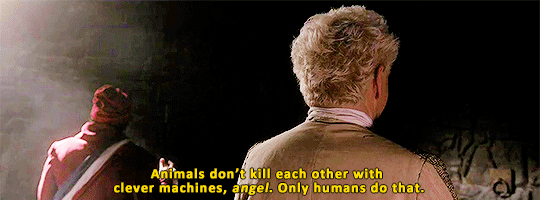
Hello. I'm here and I know you're in a spot of trouble. I like you.
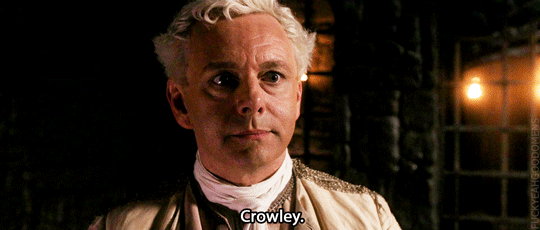
It's you! I'm so happy you're here!
Sheen's voice and face when Aziraphale says Crowley's name in this moment makes me think that Aziraphale is in love with Crowley--the demon Crowley, not the angel who became Crowley--long before he consciously realizes it in 1941. The way Sheen has Aziraphale say Crowley's name is so soft.
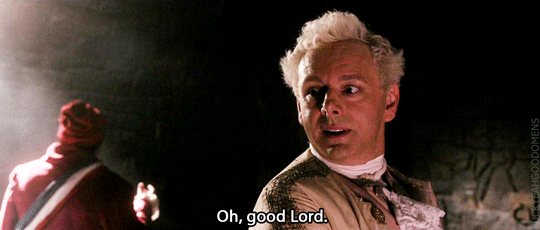
The way you're he way you're lounging there and what you're wearing are uncomfortably sexy and also incredibly inappropriate for the Bastille at this moment in history. I suppose this is very on-brand for you.
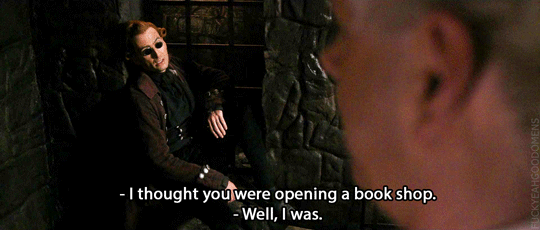
Crowley: I listen when you talk about your interests and goals and keep track of your general whereabouts and pursuits.
Either they've spoken with each other recently or Crowley has been keeping tabs on Aziraphale. Aziraphale isn't upset that Crowley knows what he's been up to, which suggests the former, which in turn suggests they're in semi-regular (every few years or decades) contact at this point.
Also we've now got a general idea for when Aziraphale opens his bookshop.
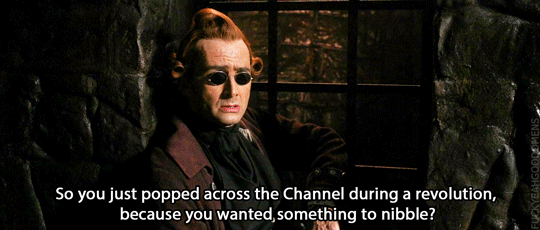
Okay, brief tangent while I point out two things here.
One, my favorite thing about Aziraphale is that he is a sensualist. This is libertine behavior, y'all. He 'popped across the Channel' during the Reign of Terror because he wanted a specific carnal experience of a specific really lovely food.
And two, even when Aziraphale does weird, frivolous, silly, ill-advised things like this, things that clearly baffle Crowley...Crowley never makes fun of him. He never laughs at him. He always has this look of disbelief on his face, like Am I hearing this?--

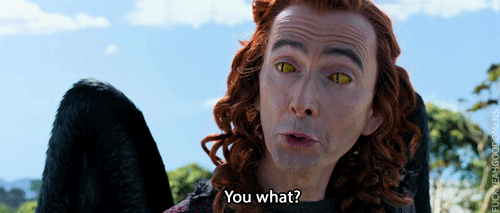
--but Crowley never, not once, shuts Aziraphale down.
Until Aziraphale asks him to go back to Heaven.
Anyway. Back to our scene.
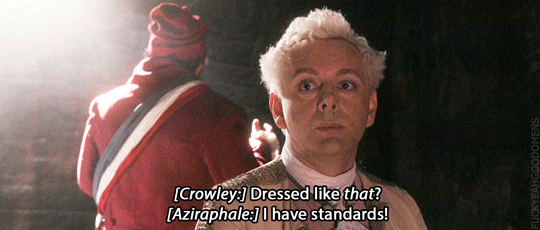
Aziraphale: I am unwilling to abandon my sartorial sensibilities even when it threatens my corporation, and I am insane, so I think this is reasonable. At least I'm not wearing a Slutty Monarchist outfit.
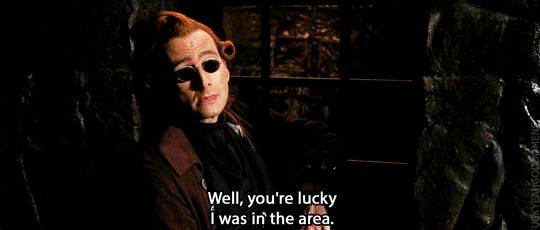
You're happy to see me, aren't you. You're relieved to see a demon. Go on, say it.
Tennant's delivery of this line cracks me up. It is so gloating and flirtatious and smarmy and indulgent of Aziraphale.
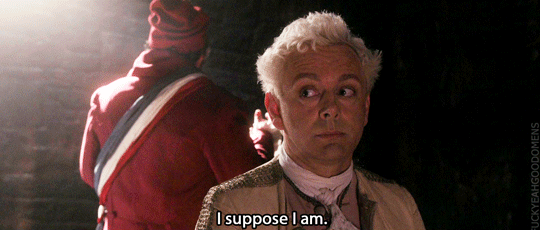
I am very happy to see you and lucky you're here, and I am willing to say so sincerely even though you are gloating about it.
And then there's the exchange where Crowley very carefully doesn't answer Aziraphale's question about why Crowley's in the area but also reassures him that he didn't cause the French Revolution and Aziraphale can still like him.
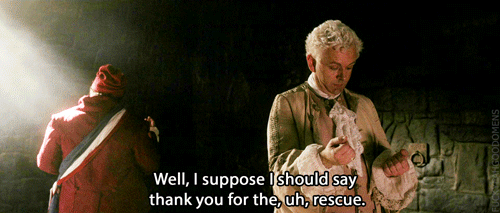
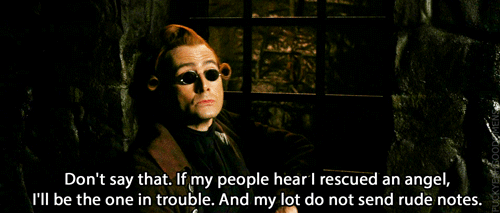
We can't speak openly about this. It's dangerous for me.
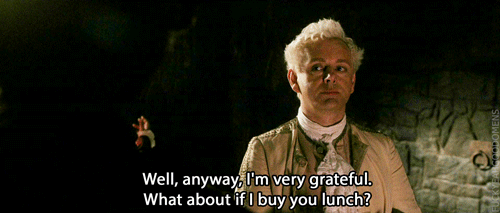
Message received: I won't mention what you did again. But I want to show my gratitude and spend time with you; is it safe for us to get lunch together?
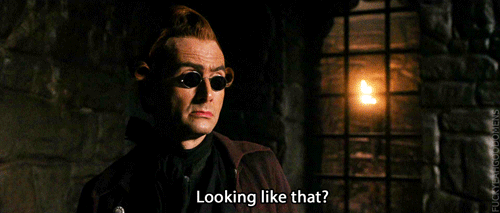
Yes, but one of us is going to have to change so we can walk the streets of Paris without getting arrested again, and I'm the one doing the rescuing here so it's not going to be me. Your 'standards' will have to take the hit.
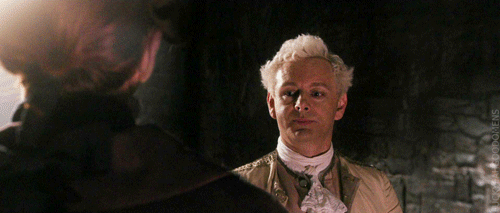
Fine, you've got me over a barrel. But hey, if I have to wear the silly hat anyway I might as well go all the way and wear your colors. Except not monarchist. And not slutty.
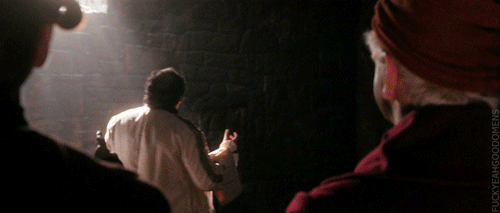
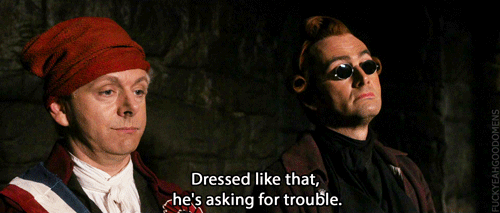
Oh, I don't know, I thought you looked pretty slutty too. (Meaning 2) I'm having this guy killed for touching you, btw. I will kill anyone who tries to hurt you. Immediately. I see you are having the guy who assaulted you killed in a copy of the clothes he would have killed you for wearing. I wholeheartedly approve of this (Meaning 3), your sexiness in those clothes notwithstanding. The utter insouciance of Crowley's little sniff and the inquiry about what they'll have for lunch drive home hard that Crowley could not be more unbothered by Aziraphale having the man who tried to harm him beheaded.
What really tickles me about this line is not only that Crowley's joke has three distinct meanings, but that Meaning 1 (the meaning that exists without reference to Crowley's clothes) is the opposite of Meaning 3--Anybody wearing clothes like that deserves what they get (Meaning 1) versus It rocks how you just killed someone who tried to kill you for wearing those clothes (Meaning 3)--and yet because of the clothes he's wearing, both meanings come through with perfect clarity, dependent only on whether the listener(s) can see his clothing and know its significance. Aziraphale can, and does, so he receives Crowley's real meaning. Hell/Heaven can't, and don't, so they just hear Meaning 1.
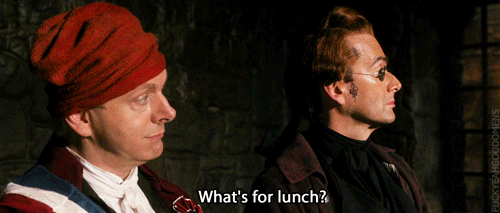
And then we get Aziraphale's pleased little smile and look of tranquil interest as he watches Jean-Claude dragged off to his death. Its such an interesting facial expression for an angel watching a demon have someone killed having someone killed, isn't it?
Crowley has just told him they're probably being listened to by Hell. That means Aziraphale, Crowley, and the audience all know this is the most Aziraphale can safely react. Aziraphale can't show any overt approval of anything an agent of Hell does, because by definition anything a demon does is demonic and angels must be against That Sort of Thing. In light of the fact that Aziraphale is the one who causes Jean-Claude's death, I now argue that this responsibility not to react too positively to something the other side has done falls on Crowley, and that the reason he makes this joke is primarily to tell Aziraphale I see what you've just done, and I like it without identifying aloud what exactly has just happened for their presumed eavesdroppers because an angel arranging a human's murder is the sort of thing in which head offices might take undue interest.
The awareness that their conversation is not private means the audience and Aziraphale know they need to be watching and listening for multiple meanings from Crowley, and it also means the audience and Crowley know we need to be watching Aziraphale's face closely right now. And that little smile shows us that Aziraphale has received Meanings 2 and 3 of "he was asking for trouble."
Or, at minimum, Meaning 3; even if Aziraphale picks up on Meaning 2--You looked really sexy in your vintage clothes, you crazy weirdo--that's not a message he can afford to react to at all. But he does react to the other coded communication Crowley is sending when he says "Dressed like that, he was asking for trouble" while dressed for trouble himself: I will kill anyone who tries to hurt you. Immediately. People who think your clothes give them the right to hurt you can go to Hell, and I am delighted you just sent one of them there.
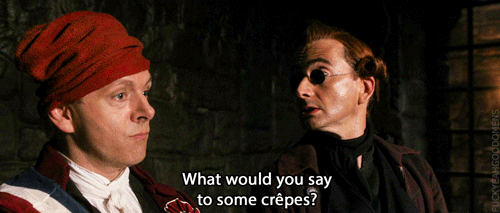
You just had someone beheaded for assaulting me, I acknowledge and am pleased by your delight at my cleverness. and I could not be happier. Would you like to come enjoy one of my very favorite sensual pleasures with me?
***
EDIT: To be honest I like this reading better than my original, incorrect understanding of the story despite the fact that it is slightly less romantic, both because I love the idea of Crowley as a thirsty witness to Aziraphale quietly being a vengeful badass, because it gives us a glimpse of something important about Aziraphale's character that we don't get to see elsewhere: Aziraphale doesn't have a problem with killing per se.
We learn from the business with the Antichrist that, like Crowley, Az. can't bring himself to kill children. We learn from his perturbation at the Flood and the Crucifixion that he doesn't hold with killing innocents. He gave away his flaming sword. But this scene establishes that Aziraphale will actively cause someone's death if he feels they deserve it. That seems like an important character note for him that may become relevant in Season 3 (feathers crossed that it happens).
And I think there's something else in there too, something about how Aziraphale kills Jean-Claude, not with outright violence but with a trick. One party thinks he's in control of the situation; with a wave of his hand, suddenly a turnip has turned into an inkwell an executioner has turned into the condemned--or at least it seems that way long enough to get the job done. It's a bait-and-switch, like stage magic, and it slots right in to the motif in Good Omens of sleight-of-hand, of characters wearing other characters' appearances (for more on this, see fan theories re: Maggie is possessed), of supplying false meanings to an audience to disguise the true actions going on behind the scenes.
#good omens#good omens 2#good omens s2#good omens analysis#good omens clothes#good omens costumes#ineffable husbands#aziracro#azcrow#azicrow#good omens equivocation#good omens 1984#good omens clothing and equivocation#good omens 1793#good omens clothes and equivocation 2
564 notes
·
View notes
Text
How Pluto Entering Aquarius Will Shape the Next Two Decades

Hold onto your hats, because the cosmos just handed us a front-row ticket to the most exhilarating and unsettling ride of the century. Pluto, the planet of transformation, power, and those deep, dark truths we’d rather shove under the rug, is strutting into Aquarius, the sign of innovation, rebellion, and humanity’s collective future. This isn’t just a cosmic shuffle. It’s a full-blown revolution that will flip the script on every corner of life as we know it. We’re talking society, technology, relationships, and yes, your personal universe. This not your average astrological transit.
Pluto doesn’t mess around. This is the planet of the phoenix, meaning if something isn’t working, it’s about to burn down to ashes. But don’t panic. Aquarius isn’t here to destroy for the sake of destruction. This air sign is the visionary genius, the tech whiz, the humanitarian. Together, they’re rewriting the rules of the game. Think of it like a power wash for your life and our world, a little messy at first, but ultimately freeing. For the next 19 years, expect seismic shifts in how we connect as a species. Aquarius rules technology and social systems, so the digital landscape will explode with changes. In terms of astrology predictions, AI won’t just be a cool tool; it’s going to reshape the job market, education, and even how we understand what it means to be human. If you’ve been clinging to outdated ways of working or communicating, Pluto is here to snap you out of it. The advice? Embrace the new. Learn, adapt, grow. That app you’re too stubborn to download could end up being the key to your next career move.
Power structures are about to collapse. Pluto in Aquarius doesn’t tolerate inequality, corruption, or anything that reeks of the old guard clinging to control. Governments, corporations, and even social hierarchies are in for a rude awakening. On a personal level, ask yourself where you’ve been giving your power away. Is it to a boss who doesn’t value you? A partner who keeps you small? A habit that numbs your potential? Pluto is here to tear those chains apart. But it’s on you to step into the freedom that follows. Of course, there’s a shadow side. Aquarius can be cold, detached, even ruthless in its pursuit of the greater good. Be wary of losing yourself in groupthink or tech dependency. Just because the world is speeding up doesn’t mean you have to lose touch with your own humanity. Make time for real conversations, face-to-face connections, and grounding rituals. This isn’t just a suggestion.
It’s a survival tool for navigating the chaos.
And let’s talk relationships. Traditional bonds might feel stifling under this influence. Aquarius loves independence and freedom, so if you’re in a situation that feels too confining, it’s time to shake things up. This doesn’t mean running for the hills every time someone asks for commitment. But it does mean being honest about what you need to thrive. Maybe that’s more space, or maybe it’s a complete reimagining of what love looks like for you. Just know this: Pluto doesn’t do surface-level. Any connection that’s shallow, fake, or rooted in outdated ideals is going to crumble. And that’s a good thing. This is also a time to dream big, no, bigger. Aquarius is the sign of invention and radical ideas. If you’ve been sitting on a creative project, a business idea, or a vision for your future, Pluto is giving you a cosmic green light. But there’s a catch. You can’t just dream it; you have to build it. Aquarius is innovative, yes, but it’s also fiercely logical. It’s about using your genius to create something real. So, roll up your sleeves. Get to work. You have a 19-year runway to make something extraordinary.
But remember, transformation isn’t a one-and-done event. Pluto moves slowly, digging deep into the cracks we don’t want to see. There will be moments when it feels too intense, too overwhelming. That’s when you lean into the Aquarian gift of vision. What kind of future do you want to build? What kind of person do you want to become? Keep your eyes on the horizon, even when the ground shakes beneath your feet. Pluto in Aquarius isn’t just a transit. It’s a call to action. It’s a demand to evolve. The world is changing, fast. And the question isn’t whether you’ll adapt. It’s whether you’ll rise to meet the opportunity. The universe believes you can. Now it’s your turn to believe it too.
Sending you all my love and blessings,
Ash (@AstroA3h via Instagram & TikTok)
✨💓
Ready for your own personal reading?
Visit astroash.net to book yours today!
#astrology#astrology readings#astrology aspects#natal chart#astrologer#astro observations#astro community#pluto#age of aquarius#aquarius#daily astrology#astrology community#astro placements#zodiac#zodiac signs#astrology signs
65 notes
·
View notes
Text
Modern day Affogato AU
____________________


_____________________________________________
✦ Characteristics:
For the sake of confusion, we’ll call this AU version of affogato „corpogato” because he runs a big ass company, obviously named Affocorp because he’d NEED his name plastered everywhere in the cacao kingdom, but in the modern day it would be called “The Cacao Republic”, as I believe it would be a communist country. The Cacao Republic is based off South Korea and Modern China. With the two cultures blending, representing the choco and coffee cookie descendants being in a cultural melting pot. This is not to be orientalist or mix two completely different cultures or ideas. The cacao republic faced a similar cultural revolution to China, heavily industrializing in its later days, and cacao’s leadership costed thousands of lives even if it wasn’t intentional. Many cacao residents suffered under said communism. For the conditions of these people, I referenced my own family’s experience in communism and stories I’ve read in books.
Affocorp is this mega corporation that started out as an unethical pharmacy, based on canon affogato’s link to medicine malpractice. At the time this pharmacy was called Affolabs, founded when Corpogato was just thirty. He has a master’s degree in pharmaceutical chemistry, so he is well aware of what substances do what, but he isn’t too concerned of the harm. The scientists backing him were apart of a union he started in secret, composed of underpaid scientists with a vendetta against Dark Cacao. Soon enough, they practically became his most loyal subjects.
Affolabs created pills that were advertised as pain medicine and antibiotics, but they were either placebo or hallucinogenic. Some even made the symptoms of ailments worse so they bought more. This “get rich quick scheme” seemed to work pretty well for the soon-to-be corporate giant, because corpogato got the “BRILLIANT” idea,, to look at other avenues of manufacturing. Keep in mind, this man is fucking evil. He’s not a misunderstood villain, he’s not morally grey, he’s EVIL. VILE. FOUL. PUTRID. So, he looked at the rise of online clothing shopping, and how people were just looking for affordable clothing. Taking advantage of this opportunity, he found a poor community, and took advantage of their labor. He set up a sweatshop, one of horrid conditions, set in the coldness of the northern cacao countryside. These workers had a terrible life ahead of them. Corpogato made their lives miserable, only working for a few coins an hour., yet the clothing was labeled as ethical, made from choco bamboo fibers or recycled material.
While he ran this hellscape, he set up his clothing brand extension: Affoexpress. Affoexpress was very much like what you think of when you imagine fast fashion. Think of it like Shein, Zara, or Romwe. Affoexpress, little by little, gained popularity, before exploding in sales with many cacao residents for its affordable prices. Many cacao residents are in poverty or at least close to it, because cacao cannot for his life manage the republic’s money, leading to a command economy. Corpogato jumped on this shit immediately. He took advantage of his preexisting close ties with cacao to “take his place.” He essentially began to expand the branches of his companies to manufacture more and more products until eventually he could make it so people could ONLY buy his products. As this plan took motion, he centralized his companies, it was now Affocorp. Each of his other companies were now just branches of Affocorp, so he could now keep a watchful eye on all of them. Corpogato had a stiff hold on his employees, he had practically a cult following on social media, and a quite literal cult underneath the layers of Affocorp. The cult in secret was very ritualistic, made up of Corpogato’s early team of scientists, who have slowly been brainwashed into unwavering loyalty. Affogato now with government power, as he did take advantage of his closeness with Cacao, bought properties, and housed his most loyal subjects. They viewed him as their savior, getting them out of the grasp of poverty, “saving their career” and now they repay him by practical worship. Corpogato made it get to a point to where they started to view him as a prophet of sorts, as Corpogato slowly laced their food and residential running water with the very substances they created.

Affoexpress started to sell more than just clothing, they began to sell cheap electronics and mini appliances. In order to do this, corpogato had to set up more and more factories, contributing to the growing air pollution of the cacao republic, leading the cacao citizens to go to his companies for medicine and masks to wear for protection from the air.
He essentially made the cacao people rely on his affocorp for every day life. Under all of this was something more sinister if you thought it couldn’t get any worse, corpogato was looking at oil drilling in secret, because once you get ahold of oil, you get ahold of the world.
_____________________________________________
Design choices:
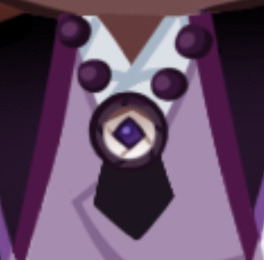
His cult emblem, its central to his body because it is central to his existence, he cannot keep on if his cult cannot.

He was given soft curls as it was remnant of his milk ancestry.

His jacket was based off of his Silla Era hanbok in his canon design.

I imagine affogato has weak knees, as he probably grew up malnourished with a genetic disposition to low iron from a very young age, which can lead to various health problems. So his staff is likely functional, and that’s why I gave him a dripped out cane.

These pants are based off of the “Baji” or pants of the hanbok.

His eyes were tilted further to the center of his face to have a more direct stare, like he’s staring into your thoughts. I also gave him little blush marks because he’d likely apply that to appear more approachable and harmless. I also gave him a wrinkle thing that most older cookies have because this man is probably pushing 50.
If you use the sprite anywhere credit would be kewl
#crk affogato#cr kingdom#cookie run#affogato coffee#artists on tumblr#character art#sprite edit#fast fashion#government corruption#dark cacao crk#dark cacao kingdom#dark cacao cookie
58 notes
·
View notes
Text

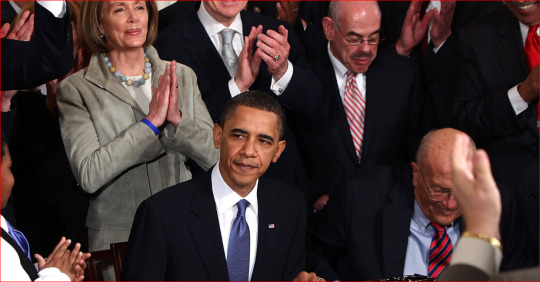
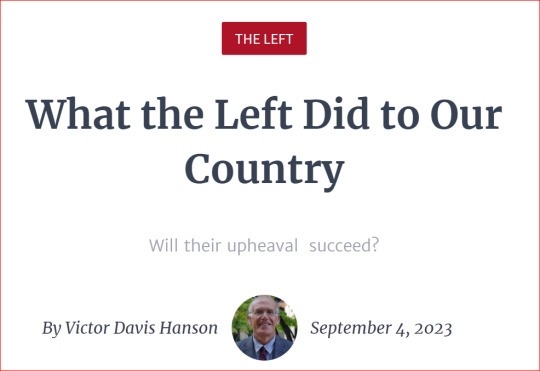
In the last 20 years, the Left has boasted that it has gained control of most of America institutions of power and influence—the corporate boardroom, media, Silicon Valley, Wall Street, the administrative state, academia, foundations, social media, entertainment, professional sports, and Hollywood.
With such support, between 2009-17, Barack Obama was empowered to transform the Democratic Party from its middle-class roots and class concerns into the party of the bicoastal rich and subsidized poor—obsessions with big money, race, a new intolerant green religion, and dividing the country into a binary of oppressors and oppressed.
The Obamas entered the presidency spouting the usual leftwing boilerplate (“spread the wealth,” “just downright mean country,” “get in their face,” “first time I’ve been proud of my country”) as upper-middle-class, former community activists, hurt that their genius and talents had not yet been sufficiently monetized.
After getting elected through temporarily pivoting to racial ecumenicalism and pseudo-calls for unity, they reverted to form and governed by dividing the country. And then the two left the White House as soon-to-be mansion living, mega-rich elites, cashing in on the fears they had inculcated over the prior eight years.
To push through the accompanying unpopular agendas of an open border, mandatory wind and solar energy, racial essentialism, and the weaponization of the state, Obama had begun demonizing his opponents and the country in general: America was an unexceptional place. Cops were racist. “Clingers” of the Midwest were hopelessly ignorant and prejudiced. Only fundamental socialist transformation could salvage a historically oppressive, immoral, and racist nation.
The people finally rebelled at such preposterousness. Obama lost his party some 1,400 local and state offices during his tenure, along with both houses of Congress. His presidency was characterized by his own polarizing mediocrity. His one legacy was Obamacare, the veritable destruction of the entire system of a once workable health insurance, of the hallowed doctor-patient relationship, and of former easy access to competent specialists.
Yet Obama’s unfufilled ambitions set the stage for the Biden administration—staffed heavily with Obama veterans—to complete the revolutionary transformation of the Democratic Party and country.
It was ironic that while Obama was acknowledged as young and charismatic, nonetheless a cognitively challenged, past plagiarist, fabulist, and utterly corrupt Joe Biden was far more effective in ramming through a socialist woke agenda and altering the very way Americans vote and conduct their legal system.
Stranger still, Biden accomplished this subversion of traditional America while debilitated and often mentally inert—along with being mired in a bribery and influence-peddling scandal that may ultimately confirm that he easily was the most corrupt president to hold office in U.S. history.
How was all this possible?
Covid had allowed the unwell Biden to run a surrogate campaign from his basement as he outsourced his politicking to a corrupt media.
Senility proved a godsend for Biden. His cognitive disabilities masked his newfound radicalism and long-accustomed incompetence. Unlike his past failed campaigns, the lockdowns allowed Biden to be rarely seen or heard—and thus as much liked in the abstract as he had previously been disliked in the concrete.
His handlers, the Obamas, and the Bernie Sanders and Elizabeth Warren radical Democrats, saw Biden’s half-century pretense as a gladhander—good ole Joe Biden from Scranton—as the perfect delivery system to funnel their own otherwise-unpopular leftwing agendas. In sum, via the listless Biden, they sought to change the very way America used to work.
And what a revolution Biden’s puppeteers have unleashed in less than three years.
They launched a base attack on the American legal system. Supreme Court judges are libeled, their houses swarmed, and their lives threatened with impunity. The Left promised to pack the court or to ignore any decision it resents. The media runs hit pieces on any conservative justice deemed too influential. The prior Senate Minority Leader Chuck Schumer whipped up a mob outside the court’s doors, and threatened two justices by name. As Schumer presciently put it, they would soon “reap the whirlwind” of what they supposedly had sowed and thus would have no idea what was about to “hit” them.
Under the pretense of Covid fears, balloting went from 70 percent participation on election day in most states to a mere 30 percent. Yet the rates of properly rejected illegal or improper ballots often dived by a magnitude of ten.
Assaults now followed on hallowed processes, laws, customs, and institutions—the Senate filibuster, the 50-state union, the Electoral College, the nine-justice Supreme Court, Election Day, and voter IDs.
Under Biden, the revolution had institutionalized first-term impeachment, the trial of an ex-president while a private citizen, and the indictment of a chief political rival and ex-president on trumped up charges by local and federal prosecutors—all to destroy a political rival and alter the 2024 election cycle.
Biden destroyed the southern border—literally. Eight million entered illegally—no background checks, no green cards, no proof of vaccinations. America will be dealing with the consequences for decades. Mexico was delighted, receiving some $60 million in annual remittances, while the cartels were empowered to ship enough fentanyl to kill 100,000 Americans a year.
“Modern monetary theory,” the Leftist absurdity that printing money ensures prosperity, followed. It has nearly bankrupted the country, unleashed wild inflation, and resulted in the highest interest rates in a quarter-century. Middle-class wages fell further behind as a doddering Biden praised his disastrous “Bidenomics.”
Biden warred on fossil fuels, cancelling federal leases and pipelines, jawboning lending agencies to defund fracking, demonizing state-of-the-art, clean-burning cars, and putting vast areas of oil- and gas-rich federals lands off-limits to drilling.
When gas prices predictably doubled under Biden and the 2022 midterms approached, he tried temporarily to lease out a few new fields, to drain the Strategic Petroleum Reserve, and to beg the Saudis, and our enemies, the Iranians, the Venezuelans, and the Russians, to pump more oil and gas that Biden himself would not. All this was a pathetic ruse to temporarily lower gas prices before the mid-term elections.
Biden abandoned Afghanistan, leaving the largest trove of military equipment behind in U.S. military history, along with thousands of loyal Afghans and pro-American contractors.
Biden insulted the parents of the 13 Marines blown up in this worst U.S. military debacle since Pearl Harbor. He lied to the parents of the dead that he too lost a son in the Iraq war, and when among them later impatiently checked his watch as he seemed bored with the commemoration of the fallen—and made no effort to hide his sense that the ceremony was tedious to him.
Vladimir Putin summed up the Afghan debacle—and Biden’s nonchalant remark that he wouldn’t react strongly to a “minor” invasion of Ukraine if it were minor—as a green light to invade Ukraine.
When Biden did awaken, his first reaction was an offer to fly the Ukrainian president Volodymyr Zelenskyy out of the country as soon as possible. What has followed proved the greatest European killing ground since the 1944-45 Battle of the Bulge, albeit one that has now fossilized into a Verdun-like quagmire that is draining American military supply stocks and killing a half-million Ukrainians and Russians.
Suddenly, there are three genders, not two. Women’s sports have been wrecked by biological men competing as women, destroying a half-century of female athletic achievement. Young girls in locker rooms, co-eds in sororities, and women in prison must dress and shower with biological men transitioning to women by assertion.
There is no longer a commitment to free speech. The American Civil Liberties Union is a woke, intolerant group trying to ban free expression under the pretense of fighting “hate” speech and “disinformation.”
The Left has revived McCarthyite loyal oaths straight out of the 1950s, forcing professors, job applicants, and students applying for college to pledge their commitment to “diversity” as a requisite for hiring, admittance, or promotion. Diversity is our era’s version of the Jacobins’ “Cult of Reason.”
Race relations hit a 50-year nadir. Joe Biden has a long history of racist insults and putdowns. And now as apparent penance, he has reinvented himself as a reverse racial provocateur, spouting nonsense about white supremacy, exploiting shootings or hyping racial tensions to ensure that an increasingly disgusted black electorate does not leave the new Democratic Party.
The military has adopted wokeism, oblivious that it has eroded meritocracy in the ranks and slashed military recruitment. It is underfunded, wracked by internal suspicion, loss of morale and ginned up racial and gender animosity. Its supply stocks are drained. Arms productions is snail-like, and generalship is seen as a revolving door to corporate defense contractor board riches.
Big-city Democratic district attorneys subverted the criminal justice system, destroyed law enforcement deterrence, and unleashed a record crime wave. Did they wish to create anarchy as protest against the normal, or were they Jokerist nihilists who delighted in sowing ruin for ruin’s sake?
Radical racial activists, with Democrat endorsement, demand polarizing racial reparations. The louder the demands, the quieter they remain about smash-and-grab looting, carjacking, and the swarming of malls by disproportionally black teens—even as black-on-black urban murders reach record proportions.
In response, Biden tried to exploit the growing tensions by spouting lies that “white supremacy” and “white privilege” fuel such racial unrest—even as his ill-gotten gains, past record of racist demagoguery and resulting lucre and mansions appear the epitome of his own so-called white privilege.
This litany of disasters could be vastly expanded, but more interesting is the why of it all?
What we are witnessing seems to be utter nihilism. The border is not porous but nonexistent. Mass looting and carjackings are not poorly punished, but simply exempt from all and any consequences. Our downtowns are reduced to a Hobbesian “war of all against all,” where the strong dictate to the weak and the latter adjust as they must. The streets of our major cities in just a few years have become precivilizational—there are more human feces on the sidewalks of San Francisco than were in the gutters of Medieval London.
The FBI and DOJ are not simply wayward and weaponized, but corrupt and renegade. Apparently the perquisite now for an FBI director is the ability either to lie while under oath or better to mask such lying by claiming amnesia or ignorance.
Immigration is akin to the vast unchecked influxes of the late Roman Empire across the Danube and Rhine that helped to finish off a millennium-old civilization that had lost all confidence in its culture and thus had no need for borders.
In other words, the revolution is not so much political as anarchist. Nothing escapes it—not ceiling fans, not natural gas cooktops, not parents at school board meetings, not Christian bakeries, not champion female swimmers, not dutiful policemen, not hard-working oil drillers, not privates and corporals in the armed forces, not teens applying on their merits to college, not anyone, anywhere, anytime.
The operating principle is either to allow or to engineer things to become so atrocious in everyday American life—the inability to afford food and fuel, the inability to walk safely in daylight in our major cities, the inability to afford to drive as one pleases, the inability to obtain or pay back a high interest loan—that the government can absorb the private sector and begin regimenting the masses along elite dictates. The more the people tire of the leftist agenda, the more its architects furiously seek to implement it, hoping that their institutional and cultural control can do what ballots cannot.
We could variously characterize their efforts as destroying the nation to save it, or burning it down to start over, or fundamentally transforming America into something never envisioned by the Founders.
Will their upheaval succeed? All the levers of the power and money are on the side of the revolutionaries. The people are not. And they are starting to wake to the notion if they do not stop the madness in their midst they very soon won’t have a country.
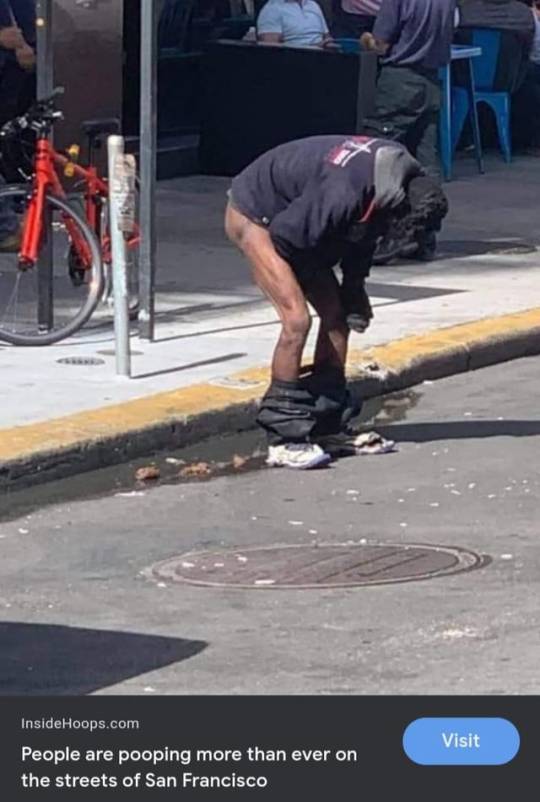
A perfect metaphor for what the progressives have done to America.
355 notes
·
View notes
Note
That’s so funny, I was speaking to a right-wing Peronist the other day. If you don’t mind answering, what about Peronism do you think makes it so versatile, and what about it do you like?
I'm so sorry for your experience, really.
Peronism has historically catched the support of the Argentine working class, and I believe it's because it's an organized, democratic movement that has actually succeeded into materially improving the lives of people. But also, it's a patriotic movement, and in Argentina, this is vital, because the Argentine right wing landowners and empresariado would sell us for 10 dollars if they had the chance and indeed they did and they still do. For first worlders, patriotism is often associated with fascism; for the third world, patriotism arises as a defense of the people against imperialism, and Peronism always saw itself as part of Latin American and third world liberation. Peronism, like I sometimes say, is not too far from other "national liberation" movements that arose during decolonization in the Third World in places such as Asia and Africa, because Argentina was (and indeed still is) an economic colony propped up by the local oligarchy, and Peronism started as the Argentine response to that, to achieve social justice (a more equal society) and economic independence (nationalization of industry). Perón might have intented to have a "guided" revolution, but the fact it that it was a revolutionary movement all the same as it led to a tectonic shift in Argentine society. For the Argentine workers, to sing "combatiendo al capital" did not went unnoticed.
While you would find, and this is true, that Peronism has a personalist bent with figures like Perón himself, Evita, and later Néstor and Cristina, I have an alternate view. It was the people who created peronism, not Perón. During the march on Plaza de Mayo in 17 October 1943, it was the people who wanted a Perón goverment because it represented their interests, and no matter the, in many cases contradictory, ideas of Perón, the movement was based on popular leadership; it was the people who made the movement. Yes, it is a populist movement, but I don't see it as an insult, it's a description.
The complicated thing about Peronism is that "Argentina needs to progress and get rid of foreign imperialism" is something that can be said by both left-wingers and right-wingers, and there are both in the Argentine working class, and the leadership has always had different ways to achieve this from communism to neoliberalism. Which has always resulted in a contradictory movement split in many currents, though this means flexibility, it also leads to "neither right wing or left wing" incoherence. However, I myself see it from a wider perspective: the various currents of Peronism (as well as other Argentine movements) represent the working class, against the established powers of Argentina; the rural oligarchy, the corporate class, the military. It is Peronism who historically advanced social and civil rights, it is peronist movements who have fought and accomplished all sorts of victories against the oligarchs since its creation.
From my own perspective, I think the ideas are clear; Peronism represents most of the Argentine working class historically, any left-wing movement must deal with this fact. Argentina was imposed right-wing dictatorships and they oppressed and impoverished our people, and then it attempted neoliberalism (for the 4th time now...) and it only ended in disaster (again) and impoverished our people. As much as some don't like it, the only option to accomplish the Peronist ideals of social justice and economic and political independence is through socialism, and given the nature of peronism as the democratic and popular movement that the Argentines feel most represented by, it should either lead to that or face extinction.
There are other people who have analyzed this better than me, as well as many other Peronists who will abhor what I've said. I accept my condition in a contradictory, complex country, and I believe it's essential to build popular support both to resist the current right-wing wave and to eventually create the conditions for socialism, which for me will be our second and definitive independence.
57 notes
·
View notes
Text
Ok so while my compooter is being repaired, let's put some thoughts about Lauren aka mommy Mother Lauren.
As some of you have said before, it appears that Lauren was the owner of Strexcorp. Kevin was the founder of the Joyous Congregation of the Smiling God. It is unclear when did Kevin changed into what he is now. On It Devours! it's implied that Kevin went to the DOW before the Strex arc on WTNV, met the Centipede, and founded the Congregation. I personally think that from then on, he was kind of like Jekyll and Hyde and he both wanted to keep his radio show and to dominate Desert Bluffs with a religious capitalist corporation so everyone would share his beliefs.
If that is the case, then Lauren helped him. And, when Strexcorp took over, they apparently co-managed it, along with all of Desert Bluffs. They struggled with power but still, Lauren was above Kevin.
After Night Vale made a revolution and both Kevin and Lauren got sent into the DOW, Kevin made his own town out of nothing. Or, well, he did after Carlos left. So it makes sense he would be above Lauren. And, being Lauren superior to him before, it makes sense that it was more tense between them.
Until all that Thing happened and Lauren got the frown tatoo and got banished from Desert Bluffs Too.
Imagine being first, the owner of a big company, then, of an entire city. Then that city conquered another and you were, legally, the owner of that city, too. Then it all is snitched from your hands. You lose it all and you're in a desert where you don't feel hunger or thirst, and there's this fucking lighthouse you can't get away from. You spend some time in that goddamned awful place until you notice that your former employee who you shared ownership of your company and everything you had before with, has founded a new town, but he won't share it with you. He's your boss now.
It would suck.
And then, from an order you received from him, you get mocked and hated by this new community. And while that bastard is happy building his adoration pit and being happy with his boyfriend, you're being tattooed a permanent frown on your face, losing whatever little power you got to recover and being banished from the new town.
I believe that, after all the traumatizing Experience of being thrown into the DOW, Lauren just wanted to be loved. To feel the sense of community she thought she felt before. But she wasn't loved. She then was hated and rejected. So, being that new society a religious one, a way of being loved could be through religion.
And so she became Mother Lauren. First, being the High Priestess — probably the equivalent of the Pope. She would have had to ascend slowly through different ranks to get to that point. So she built that image by herself, and she did that so other people would love her. To connect with others.
But now? Now it seems like Mother Lauren, apparently the counterpart of Huntokar, has possessed her like Huntokar did with Susan Willman.
And, it looks like Mother Lauren is the og Smiling God.
It's like. Huntokar said that while Night Vale used bloodstones to adore her, they didn't know it was she who they were adoring. In the same way, people from Desert Bluffs adored the Centipede without knowing it was Mother Lauren who they were really worshipping. And it makes sense. Total sense in fact. Because, after reading It Devours!, there was something that I couldn't sit with. Darryl & Co. continued worshipping the Smiling God, even after Carlos killed what they thought was the Smiling God, the Centipede. It made a bit of sense, because religion is about community and faith. That's why I also thought that you can't kill a god. Because belief in a deity is about faith. And, if the group shares the belief that it's not dead, then it's still alive.
The only ones that witnessed the burning of the Centipede were Nilanjana, Darryl & Co, so it wouldn't make sense that other worshipping sites believed in the death of their god: it should still be alive. Science can't kill a god. The only thing able to "kill" a god is another god, or another belief.
The Centipede was the manifestation of the Smiling God. Kind of like Jesus was the manifestation of God. In the last episode, I think I heard something about there being more existing centipedes (in It Devours!, the characters haven't seen another centipede). Again, kind of like Jesus was also a man, and there exist other human men.
All this to say that, based on the descriptions of the last episode, we know Lauren has lost control of herself. She's no longer Lauren Mallard. She's Mother Lauren. And, based on the descriptions of the last episode, Mother Lauren is becoming her manifestation. She's turning into a Centipede.
#wtnv#welcome to night vale#HOW did i write THIS MUCH??#lauren mallard#kevin wtnv#it devours!#long post
23 notes
·
View notes
Text
The Communist Manifesto - Part 2
[ ◁ First | ◃Prev | Table of Contents | Next ▹ ]
The feudal system of industry, in which industrial production was monopolised by closed guilds, now no longer sufficed for the growing wants of the new markets. The manufacturing system took its place. The guild-masters were pushed on one side by the manufacturing middle class; division of labour between the different corporate guilds vanished in the face of division of labour in each single workshop.
Meantime the markets kept ever growing, the demand ever rising. Even manufacturer no longer sufficed. Thereupon, steam and machinery revolutionised industrial production. The place of manufacture was taken by the giant, Modern Industry; the place of the industrial middle class by industrial millionaires, the leaders of the whole industrial armies, the modern bourgeois.
Modern industry has established the world market, for which the discovery of America paved the way. This market has given an immense development to commerce, to navigation, to communication by land. This development has, in its turn, reacted on the extension of industry; and in proportion as industry, commerce, navigation, railways extended, in the same proportion the bourgeoisie developed, increased its capital, and pushed into the background every class handed down from the Middle Ages.
We see, therefore, how the modern bourgeoisie is itself the product of a long course of development, of a series of revolutions in the modes of production and of exchange.
Each step in the development of the bourgeoisie was accompanied by a corresponding political advance of that class. An oppressed class under the sway of the feudal nobility, an armed and self-governing association in the medieval commune*: here independent urban republic (as in Italy and Germany); there taxable “third estate” of the monarchy (as in France); afterwards, in the period of manufacturing proper, serving either the semi-feudal or the absolute monarchy as a counterpoise against the nobility, and, in fact, cornerstone of the great monarchies in general, the bourgeoisie has at last, since the establishment of Modern Industry and of the world market, conquered for itself, in the modern representative State, exclusive political sway. The executive of the modern state is but a committee for managing the common affairs of the whole bourgeoisie.
* This was the name given their urban communities by the townsmen of Italy and France, after they had purchased or conquered their initial rights of self-government from their feudal lords. [Engels, 1890 German edition] “Commune” was the name taken in France by the nascent towns even before they had conquered from their feudal lords and masters local self-government and political rights as the “Third Estate.” Generally speaking, for the economical development of the bourgeoisie, England is here taken as the typical country, for its political development, France. [Engels, 1888 English Edition]
The bourgeoisie, historically, has played a most revolutionary part.
The bourgeoisie, wherever it has got the upper hand, has put an end to all feudal, patriarchal, idyllic relations. It has pitilessly torn asunder the motley feudal ties that bound man to his “natural superiors”, and has left remaining no other nexus between man and man than naked self-interest, than callous “cash payment”. It has drowned the most heavenly ecstasies of religious fervour, of chivalrous enthusiasm, of philistine sentimentalism, in the icy water of egotistical calculation. It has resolved personal worth into exchange value, and in place of the numberless indefeasible chartered freedoms, has set up that single, unconscionable freedom – Free Trade. In one word, for exploitation, veiled by religious and political illusions, it has substituted naked, shameless, direct, brutal exploitation.
The bourgeoisie has stripped of its halo every occupation hitherto honoured and looked up to with reverent awe. It has converted the physician, the lawyer, the priest, the poet, the man of science, into its paid wage labourers.
The bourgeoisie has torn away from the family its sentimental veil, and has reduced the family relation to a mere money relation.
[ ◁ First | ◃Prev | Table of Contents | Next ▹ ]
24 notes
·
View notes
Text
Uzi the Anarcho-Communist
A literary deep dive into the themes of Murder Drones.
(note, this took way to long to write and is far from finished and I know this is self-serving but can you please if you read this reblog it)
Although the show very much is a critique of capitalism, I don't think that's its primary theme, instead I believe the primary theme of the show is Hubris which notably emerges throughout the show but this is about communism. First lets discuss the idea that the show critiques capitalism in its plot and theming.
The opening line to the show is "we are worker drones". 'Worker' is very much a common phrase used in Marxist ideas (most famously in the quote "Workers of the land, Unite!"). Worker in this context is used to refer to a member of the working class. The word 'drone' also creates this association with dull monotony mirroring the lives of the drones.
The second shot in the show is of a group of worker drones all identical in expression, height, eye colour, clothing—very much every detail. This is the first time we really see this idea that the WDs lack individuality which is another idea discussed by Karl Marx's Gattungswesen. This lack of individuality is very much an extreme example of what Marx calls Objective Alienation, the WDs have been deprived of there right to think in the name of windex maximizing profits for those who control the means of production (in this case humans).
The third shot (authors note, can't believe we're only 19 seconds into episode 1, this is going to take forever) we finally see the face of evil, a corporation in the form of its name superimposing over the scene; its happy, outdated style juxtaposes the cold, dreary reality the WDs are living through. I would go deeper into this but if you don't know how corporations tie into Marxism theory then you need to pick up a book.
The fourth shot is so full of small details I just have to give a screenshot to appreciate its subtlety.

Top left, you can see a WD working in a precarious position working environment, not much to mention because it's doing more to play as environmental story telling for the other parts of the scene. At the highest point of the shot, JCJenson logo almost like a title basically saying this is JCJenson and also the height can be viewed as a metaphor for their position in the hierarchy. To the signs right is the control room, the only area which is kept well lit, the control room is also were the highest authority present would mingle, good lighting is a luxury of the rich (the withholding of basic rights like food, shelter and [in this case] light is again a critique Marx makes against capitalism). Bottom right, a group of humans standing around doing very little standing around the destroyed body of a worker drone not stopping the ant like WDs walking ever closer or helping the WD clinging for there life in the top right of the screen. The lives and safety of the WDs is off little consequence to the humans which is the other side of Alienation, those in power stop viewing the workers as people and more as machines to be exploited; to stop production would be the greatest sin.
The fifth, sixth, seventh and eight shots, the culmination of the humans actions. In pursuit of production, the humans led to there own downfall, being blissfully unaware until it was too late and the greatest joke, the workers survived and didn't care. This very much mirrors a lot of modern criticisms of capitalism especially around the ideas of climate change. Knowing what we know after watching the show, that the core collapse was almost certainly no coincidence, instead likely a plot by WDs (specifically the Absolute Solver) then it fits into Marxist theory specifically around Proletariat Revolution which Marx states is the inevitability of capitalism.
The ninth shot, the most important which will be made incredibly evident once I show a picture.
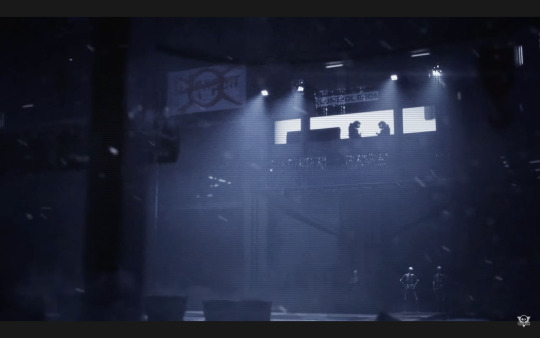
Its a direct parallel to the fourth shot. Firstly, the orange colour has very much been lost for a cool blue which if you note has always been the colour associated with the workers throughout all of the previous scenes, its encapsulation shows the shift in power. The JCJenson logo replaced with a graffiti doodle (somewhat similar to the anarchists symbol). And the most obvious, the workers sitting in the control room, they are now in control while the humans lay dead below them. The results of this revolution though won't be made evident until the next shot so |: moving on.
(authors note. A MINUTE IN WOOO!)
The tenth shot, the WDs now are showing unique characteristics and identities! This is the emergence of Gattungswesen, remember that one word I mentioned before but didn't really talk about well here we are now. Gattungswesen refers to what Karl Marx thinks make humans human; Marx considers the idea that identity emerges from individuals is foolish instead ones identity emerges from there social relations which is exactly what we see in this opening scene.
"They themselves begin to distinguish themselves from animals as soon as they begin to produce their means of subsistence, a step which is conditioned by their physical organisation." - Karl Marx
Marx also considers the death of personal identity one of the evil components of capitalism.
At this point, I should start talking about the disassembly drones but there's too much to talk about and I'm tired because I didn't anticipate the opening minute being so jam packed with information so I'll instead continue by talking about the Worker Drone civilisation and then Uzi (author note, ughh bite me that's a lot of writing).
In the Worker Drones civilisation, two things are very notable—both neither a hierarchy nor a market seems to exist.
The only characters seen with some hierarchical power are Kahn and Teacher but even then the Teacher doesn't have governing power, instead his power comes from his title as Teacher. Kahn on the other hand is more complicated; he does hold real power as the leader of the Worker Drone Protection Corp (Author note. to tired and lazy to verify if that's correct); at the same time the nature of his power is vague, he is never shown to have any political power nor is a political system present.
The absence of a market or capitalist constructs (a market isn't strictly capitalist but for the discussion its close enough). The only example in the WD civilisation the only time we see anything similar is in episode 2 with the vending machine (which we don't see used), the sight of all the murders by Eldritch J. Without going deep into J, its hard to go deep into this but it can be very easily read as a metaphor for how capitalism weaponises consumption.
Overall, it seems most likely beyond any other alternative (not saying an alternative is possible), but with the backing of the anti-capitalist symbolism discussed earlier, the WDs very much live in a anarcho-communist Commune.
Finally, onto the subject matter of the title, Uzi. Lets go through all the different pieces of evidence that imply that Uzi is a communist.
To begin, she's anti-authoritarian. She is very rebellious in nature, not just against Teacher but also her father. The inciting incident of the entire story is when Uzi betrays her fathers authority to go and fight the Disassembly Drones (who very much represented the police and the will of the higher authority of JCJenson).
When talking to the deluded N, she tried to convince him to rebel through using the communist argument that they are living in Subjective Alienation (more commonly refered to as 'false consciousness'), they are unaware that the humans just see them as the means to an end. Later, N starts discussing other communist ideas with J, namely there is no difference between them and the WDs, instead they are very much the same.
(author note for future reference, WDs are Lumpenproletariats)
There is more to talk about, but I'm tired.
#murder drones#murder drones spoilers#uzi murder drones#communism#anarchism#anarchocommunism#glitch productions#murder drones details#marxism
15 notes
·
View notes
Text
On August 27, African faith, farming, and environmental leaders came together to launch an unusual statement. Their open letter was addressed to “the Gates Foundation and other funders of industrial agriculture.” It charged these funders with promoting a type of corporate, industrial agriculture that does not respect African ecosystems or agricultural traditions.
The letter was organized by the Southern African Faith Communities’ Environment Institute (SAFCEI), and has over 150 signatories. Its release was timed to influence the Africa Food Systems Forum in Kigali, which starts today. Partners of this conference include the Rwandan government, AGRA, the Bill & Melinda Gates Foundation and other philanthropies, agribusiness companies, and aid organizations.
The open letter takes particular aim at two linked organizations. The Gates Foundation is primarily known for its public health investments, but has also made major inroads into agriculture. In Africa much of this work extends through the Nairobi-based AGRA (previously known as the Alliance for a Green Revolution in Africa). The Gates Foundation is a cofounder and the largest donor to AGRA. Other large donors include the UK and US governments.
Under a basket of policies dubbed the “green revolution,” AGRA, the Gates Foundation, and likeminded institutions have sought to substantially increase the use of synthetic fertilizers, pesticides, and commercial seeds in Africa. This has centered on developing new seeds and a network of sellers. The aim has been to dramatically increase agricultural output, in order to reduce hunger and elevate farmer incomes.
But by AGRA’s own admission, it failed in its goal to double crop yields and incomes for 30 million farmers by 2020. In fact, some critics argue, AGRA has made things worse.
According to an external assessment by Timothy A. Wise of Tufts University, severe hunger in AGRA countries increased by 30% between AGRA’s founding and 2018. Crop yield increases have been modest, and where they exist, they haven’t always been enough to cover the higher cost of farming with commercial seeds and agricultural inputs. Dependence on fertilizer has increased the debt and financial precarity of the small farmers who make up the majority of farmers in Africa. In some cases the limited yield increases have also been temporary, as soil fertility has diminished due to monoculture farming and fertilizer use. For instance, Ethiopian farmers “will say that the soil is corrupted, meaning it cannot produce food” without synthetic fertilizer, reports Million Belay of the Alliance for Food Sovereignty in Africa (AFSA).
There have been knock-on effects, Belay says. For instance, Zambian farmers who have become indebted, due to synthetic fertilizer purchases, have had less money for food and their children’s education.
In other words, many farmers’ families are poorer and hungrier than before, while the land itself is less productive.
While AGRA hasn’t managed to double farmer income and yields, it has succeeded in shifting government policies for the worse, according to Belay. These include the dilution of regional biosafety regulations and fertilizer regulations, Belay says. In Kenya, farmers can now face prison time for saving or sharing seeds.
A new AFSA briefing note states that AGRA is seeking to place consultants within government offices and “directly crafting policies at the continental, national, and local levels.” This includes a new 10-year policy for agricultural investment in Zambia.
All, in all, it’s a highly commercialized, elite, and often rich-world vision of African agriculture. Tim Schwab writes in The Bill Gates Problem: Reckoning with the Myth of the Good Billionaire, “Rarely, however, do the targets of Gates’s goodwill, the global poor or smallholder farmers, have a seat at the table. In the case of the Alliance for a Green Revolution in Africa, or AGRA, the allies include a bevy of corporate partners: Syngenta, Bayer (Monsanto), Corteva Agriscience, John Deere, Nestlé, and even Microsoft.” AGRA has been criticized for aiding its agricultural partners to expand in Africa.
#enviromentalism#ecology#industrial agriculture#agribusiness#agriculture#gates foundation#Bill gates#africa
5 notes
·
View notes
Text
Who Else is Sick of the Puppet Show?
In today's world, it seems like every turn we take, we’re greeted by the grand theatre of politics. It's a show filled with dramatic entrances, scandalous plots, and character arcs that could rival any soap opera. But as captivating as it might seem from a distance, the reality is much more disheartening. Politics has become nothing more than a sick game, and many of us are fed up with the puppet show.
The Illusion of Choice
One of the most frustrating aspects of modern politics is the illusion of choice. We're often presented with two or more candidates who, on the surface, appear to have different agendas and solutions. However, scratch beneath the surface, and you'll find that many of these politicians are backed by the same corporate interests and influenced by similar lobbying groups. It's a rigged game where the players might change, but the puppeteers remain the same.
The Cycle of Scandal and Distraction
Political scandals are now so frequent that they barely make headlines. What should be shocking and unacceptable behaviour has become the norm. Politicians from all sides are involved in corruption, deceit, and hypocrisy. Instead of addressing these issues, the media and political strategists often use them as distractions, keeping the public focused on the sensational rather than the substantial.
Empty Promises and Hollow Victories
Every election cycle, we are bombarded with grand promises of change, prosperity, and progress. But once the elections are over and the dust has settled, these promises often fade into obscurity. Politicians prioritise maintaining their power and catering to their financial backers over delivering on their commitments to the electorate. The cycle continues, leaving the public disillusioned and distrustful.
Polarization and Division
Another sickening aspect of the political game is the deliberate polarisation and division of society. Politicians and their allies use divisive rhetoric to pit one group against another, creating an environment of hostility and mistrust. This strategy ensures that the public remains divided and distracted, making it easier for those in power to push their agendas without facing unified opposition.
The Puppeteers Behind the Curtain
At the heart of this political theatre are the real puppeteers – the wealthy elites and powerful corporations who pull the strings. These entities have the resources to influence policies, manipulate markets, and shape public opinion to serve their interests. While the public is entertained by the puppet show on stage, these shadowy figures continue to amass wealth and power, often at the expense of the common good.
So, what can be done to break free from this sick game? It starts with awareness and education. The public must be informed about the true nature of the political system and the forces at play. From there, it’s about demanding transparency, accountability, and genuine representation. Grassroots movements, community organising, and active participation in the political process can help reclaim power for the people.
We must also seek to bridge the divisions that have been deliberately sown among us. By finding common ground and working together, we can challenge the status quo and push for meaningful change. It’s time to move beyond the puppet show and create a political system that truly serves the people, not the powerful few.
The current state of politics is indeed a sick game, one that many of us are tired of watching. The puppet show has gone on for far too long, and it’s time for a change. By recognising the illusion, rejecting divisive tactics, and demanding accountability, we can start to dismantle the puppet theatre and build a political system that is just, transparent, and truly representative of the people’s will. Who else is sick of the puppet show? It’s time to rise up, reclaim our power, and create the change we desperately need.
Remember THE REVOLUTION WILL NOT BE TELEVISED!
#PoliticalReform#EndCorruption#TrueDemocracy#TransparencyNow#Accountability#WakeUp#GrassrootsMovement#RealChange#BreakTheCycle#StopTheScandals#UnitedWeStand#FightForJustice#PoliticalAwareness#NoMoreIllusions#DemandChange#PowerToThePeople#SystemicChange#PoliticalAccountability#ExposeTheTruth#PeopleOverProfits#new blog#today on tumblr
2 notes
·
View notes
Text
There's a culture beyond color that's struggling for unambiguity,
chatter on social media is supportive of egalitarian communities,
young adults today are discovering new sexual identities,
letting go of institutions and seeking personal destinies.
These modern times do seem strange,
but attitudes and behaviors don't really change,
its just faces and places that rearrange.
The workplace no longer rewards service and devotion.
long hours and hard work does not guarantee a promotion,
shouting in the streets for equality and causing a commotion,
in these modern times are we really seeing a revolution.
Just another year of social unrest,
vocalizing discontent and community stress,
struggling for true freedom and feeling repressed.
Trickle down economics is a lie,
the rich want the milk and honey and all of the pie,
the good patriots of this land still celebrate the 4th of July,
some are free of the cocoon and fly like a butterfly.
The day you enter the workplace is the start of your debt,
climbing the corporate ladder, the greedy are dead set,
chasing the dream, their humanity becomes a fading silhouette.
Corporate news is still manipulating the viewer,
intense reports of terrorists on their latest maneuver,
semi automatics now taking out high schooler's,
are today's children going to inherit a dystopian future.
Fear and terror on the increase,
more people suspicious of neighbor and the police,
is any where safe in search of peace.
#my post#my poem#spilled words#poem#my poetry#poems and poetry#new poem#spilled thoughts#poetry#rhyme#society/community#perspective#modern life
10 notes
·
View notes
Text

I wanna be perfectly clear, poozers, it's ethical ta' fight fascists. Full stop, don't ya' dare take this ta' mean anything ta' the contrary.
But the fascists, they like ta' pretend that's all we do. An' sure, if people are in danger we'll defend 'em, sometimes ya' gotta get in a scrap, but 99% of what leftists do is helpin' the community. Leftists staff charity drives, run food banks, teach education, raise money ta' help those in need, advocate fer their communities with the government, an' all sorta other things. If corporate media was honest, that's the face of Antifa, BLM, an' other leftists that we'd see, because that's most of what we do.
We ain't mindless fighters. We're smart an' tactical fighters. We're workin' on a revolution, an' that means usin' all sorts a' tactics, an' keepin' our communities strong and organized! An sometimes that means even though it's ethical ta' clobber Sinestro, once people ain't in danger there might be better things I can do with my time.
#comics#dc comics#green lantern#kilowog#arisia rrab#sinestro#leftism#antifascist#blm#activism#Good doesn't mean best and not doing the best thing doesn't mean wrong#Support all forms of protest against all forms of oppression no matter what they are#local organizing is the only way out
7 notes
·
View notes
Text



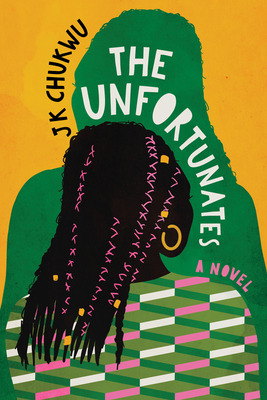
Notable First Novels of 2023
Bellies by Nicola Dinan
I wore a dress on the night I first met Ming.
It begins as your typical boy meets boy. While out with friends at their local university drag night, Tom buys Ming a drink. Confident and witty, a magnetic young playwright, Ming is the perfect antidote to Tom’s awkward energy, and their connection is instant. Tom finds himself deeply and desperately drawn into Ming’s orbit, and on the cusp of graduation, he’s already mapped out their future together. But shortly after they move to London to start their next chapter, Ming announces her intention to transition.
From London to Kuala Lumpur, New York to Cologne, we follow Tom and Ming as they face tectonic shifts in their relationship and friend circle in the wake of Ming’s transition. Through a spiral of unforeseen crises—some personal, some professional, some life-altering—Tom and Ming are forced to confront the vastly different shapes their lives have taken since graduating, and each must answer the essential question: Is it worth losing a part of yourself to become who you are?
Chain-Gang All-Stars by Nana Kwame Adjei-Brenyah
Loretta Thurwar and Hamara "Hurricane Staxxx" Stacker are the stars of Chain-Gang All-Stars, the cornerstone of CAPE, or Criminal Action Penal Entertainment, a highly-popular, highly-controversial, profit-raising program in America's increasingly dominant private prison industry. It's the return of the gladiators and prisoners are competing for the ultimate prize: their freedom.
In CAPE, prisoners travel as Links in Chain-Gangs, competing in death-matches for packed arenas with righteous protestors at the gates. Thurwar and Staxxx, both teammates and lovers, are the fan favorites. And if all goes well, Thurwar will be free in just a few matches, a fact she carries as heavily as her lethal hammer. As she prepares to leave her fellow Links, she considers how she might help preserve their humanity, in defiance of these so-called games, but CAPE's corporate owners will stop at nothing to protect their status quo and the obstacles they lay in Thurwar's path have devastating consequences.
Natural Beauty by Ling Ling Huang
Our narrator produces a sound from the piano no one else at the Conservatory can. She employs a technique she learned from her parents—also talented musicians—who fled China in the wake of the Cultural Revolution. But when an accident leaves her parents debilitated, she abandons her future for a job at a high-end beauty and wellness store in New York City.
Holistik is known for its remarkable products and procedures—from remoras that suck out cheap Botox to eyelash extensions made of spider silk—and her new job affords her entry into a world of privilege and a long-awaited sense of belonging. She becomes transfixed by Helen, the niece of Holistik’s charismatic owner, and the two strike up a friendship that hazily veers into more. All the while, our narrator is plied with products that slim her thighs, smooth her skin, and lighten her hair. But beneath these creams and tinctures lies something sinister.
The Unfortunates by J.K. Chukwu
Sahara is Not Okay. Entering her sophomore year at Elite University, she feels like a failure: her body is too curvy, her love life is nonexistent, her family is disappointed in her, her grades are terrible, and, well, the few Black classmates she has just keep dying. Sahara is close to giving up, herself: her depression is, as she says, her only “Life Partner.”
And this narrative—taking the form of an irreverent, piercing “thesis” to the university committee that will judge her—is meant to be a final unfurling of her singular, unforgettable voice before her own inevitable disappearance and death. But over the course of this wild sophomore year, and supported by her eccentric community of BIPOC women, Sahara will eventually find hope, answers, and an unexpected redemption.
#debut novel#lgbtqia books#fiction#2023 books#reading recommendations#reading recs#book recommendations#book recs#library books#tbr#tbr pile#to read#booklr#book tumblr#book blog#library blog#readers advisory
3 notes
·
View notes
Text


I read these two books back to back, an unplanned diptych on agriculture and impending drought, one set in the Great Plains of the U.S. and the other in the grasslands (I am suspect this is the wrong term but I am in a rush to close out this post) of Australia. I think about soil more frequently than one might suspect for someone who lives in an apartment without access to any dirt beyond a few pots. I also think about composting toilets ALL THE TIME (see the managing manure book linked below the other book descriptions).
I really loved the Bessire book, I've checked it out as an ebook and an audiobook from the public library. But there is a story from Chapter 3 of the Massy book that has lingered for weeks now. It is a story in the archives, from a 19th century sheep farmer in Australia who lamented that the great grassland sheep station he had taken over in 1840 had deteriorated to barren ruts by 1853. The farmer sold the land and moved away. In thirteen years, extractivism had stripped the earth. Later in the book, Massy writes about landscape dyslexia, how most of we can no longer read the land. I wonder about those first settlers, marveling at the fertility of the land, and how badly they misread the landscape.
Running Out: In Search of Water on the High Plains by Lucas Bessire (2021)
The Ogallala aquifer has nourished life on the American Great Plains for millennia. But less than a century of unsustainable irrigation farming has taxed much of the aquifer beyond repair. The imminent depletion of the Ogallala and other aquifers around the world is a defining planetary crisis of our times. Running Out offers a uniquely personal account of aquifer depletion and the deeper layers through which it gains meaning and force. Anthropologist Lucas Bessire journeyed back to western Kansas, where five generations of his family lived as irrigation farmers and ranchers, to try to make sense of this vital resource and its loss. His search for water across the drying High Plains brings the reader face to face with the stark realities of industrial agriculture, eroding democratic norms, and surreal interpretations of a looming disaster. Yet the destination is far from predictable, as the book seeks to move beyond the words and genres through which destruction is often known. Instead, this journey into the morass of eradication offers a series of unexpected discoveries about what it means to inherit the troubled legacies of the past and how we can take responsibility for a more inclusive, sustainable future. An urgent and unsettling meditation on environmental change, Running Out is a revelatory account of family, complicity, loss, and what it means to find your way back home.
Call of the Reed Warbler: A New Agriculture, A New Earth by Charles Massy (2017):
In Call of the Reed Warbler, Charles Massy explores regenerative agriculture and the vital connection between our soil and our health. It is the story of how a grassroots revolution—a true underground insurgency—can save the planet, help reduce and reverse climate change, and build healthy people and healthy communities, pivoting significantly on our relationship with growing and consuming food. Using his personal experience as a touchstone—from an unknowing, chemical-using farmer with dead soils to a radical ecologist farmer carefully regenerating a 2000-hectare property to a state of natural health—Massy tells the real story behind industrial agriculture and the global profit-obsessed corporations driving it. With evocative stories, he shows how other innovative and courageous farmers are finding a new way. At stake is not only a revolution in human health and in our communities, but the very survival of the planet. For farmers, backyard gardeners, food buyers, health workers, policy makers, and public leaders alike, Call of the Reed Warbler offers a tangible path forward and a powerful and moving paean of hope.
Holy Shit: Managing Manure to Save Mankind by Gene Logsdon (2010).
A review: "He begins by lamenting a modern society that not only throws away both animal and human manure, worth billions of dollars in fertilizer value, but that spends a staggering amount of money to do so. This wastefulness makes even less sense as the supply of mined or chemically synthesized fertilizers dwindles and their cost skyrockets. In fact, he argues, if we do not learn how to turn our manures into fertilizer to keep food production in line with the increasing population, our civilization, like so many that went before it, will inevitably decline."
5 notes
·
View notes